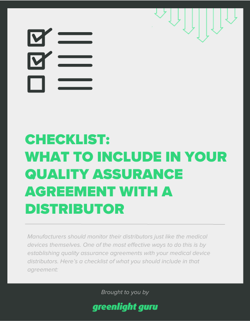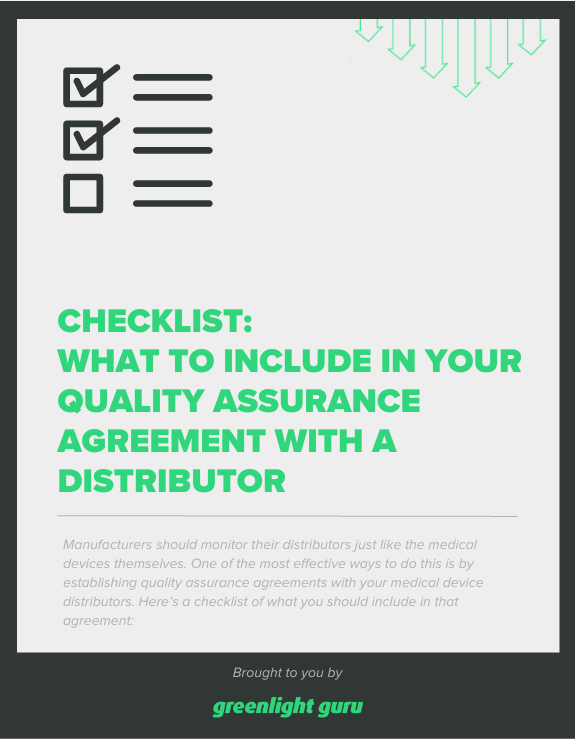How To Vet Medical Device Distributors in Multiple Markets

The majority of medical device companies, even the relatively big ones, will need third-party distributors to get their devices to market.
Choosing the right medical device distributor(s) is a very particular matter. A good way to go about the process is simply by treating your distributors as you would any other supplier. You’ll need to vet them and audit them for their ability to meet regulatory and device requirements, and create a contractual agreement for both sides.
The question is, what does that vetting process look like? What are the questions you should be asking and the answers you should be looking for?
There are always going to be companies that are excellent at logistics, but that’s not enough for a heavily regulated industry like MedTech. So, in this article, I want to break down some of the considerations that any MedTech company should be thinking about as they vet distributors.
How to vet medical device distributors
Audit potential distributors against any regulatory requirements they’ll need to meet
The first consideration is easy enough—can they meet the relevant regulatory requirements for your target markets?
For instance, in the EU, Chapter II of EU MDR offers a full list of economic operators, including distributors, and the legal responsibilities of each. One of those responsibilities is complaint handling.
EU MDR requires distributors to have a complaint handling process in place. It’s not necessarily a dealbreaker if a potential distributor doesn’t have one, but they will need to be willing to put one in place to satisfy MDR requirements if you’re going to move forward with them.
In the US, FDA regulations don’t talk about economic operators at all. But FDA still wants to see the appropriate level of traceability through your entire supply chain, from raw materials to the finished product a user is handling.
FDA regulations require medical device distributors to promptly provide the manufacturer with “The unique device identifier (UDI), lot number, batch number, model number, or serial number of the device or other identifier used by the manufacturer to track the device,” upon purchasing the device.
On top of that, ISO 13485:2016, which is required in the EU and will soon be harmonized with FDA’s Quality System Regulations, also requires that for implantable devices, “suppliers of distribution services or distributors maintain records of the distribution of medical devices to allow traceability and that these records are available for inspection.”
The upshot of all these regulations and standards is that any distributor you choose will need to be capable of maintaining traceability throughout the supply chain while meeting relevant regulations. If a distributor hasn’t heard of MDR or isn’t familiar with UDI requirements for medical devices, for instance, that should be a red flag.
Ensure this distributor can meet your medical device’s requirements
Let’s say you’ve got some potential distributors that you know are capable of handling the regulatory aspects of medical device distribution. The next question is, are they capable of handling your device?
There are a couple variables here:
-
The physical attributes of your device may require specific conditions for its handling, storage, and distribution.
-
The distributor must be capable of getting the device back in case of a problem with the device. This may be more or less easy depending on the device’s final destination.
Let’s start with the physical requirements. Before vetting distributors, it’s a good idea to write a “user requirements” document you can refer back to. This document isn’t a wish list—it’s the minimum requirements a distributor will have to be able to meet to be considered.
These requirements could be things like:
-
Environmental controls. Does your product have specific environmental requirements, such as clean room storage or specific temperature, humidity, or light requirements? Can this distributor meet all of those requirements during handling, storage, and transport of the product?
-
Product segregation. Does your product need to be separated from other products? Does this distributor have a specific place where your product will be stored?
Essentially, you’re holding them to your product’s requirements—how it must be handled, stored, and shipped. All of that should be reflected in your contractual agreement.
The second product-based consideration is where your device is going and whether a distributor can get it back.
In some cases, a device is only used in a hospital setting where a physician or other healthcare professional is using it or facilitating its use. An MRI machine, for instance, probably isn’t leaving the premises of the hospital.
In other cases, a device might be going to a drugstore, where it’s sold over the counter and the patient takes it home and uses it themselves. If there should be a problem with a batch, or your device in general, does your distributor have the capability of getting it back? Will they be able to use the UDI to facilitate the return of the devices?
That’s not as big an issue in a hospital setting where inventories are kept and use is limited to a physical location. But it could be a real issue if you need to recall a device sold to patients over the counter.
Consider prior experience and capabilities of medical device distributors
We’ve covered some of the must-haves you’ll need to vet your medical device distributor against, but there are more subjective decisions you’ll need to make. Ideally, you want a distributor who is capable of handling paperwork from multiple jurisdictions, with a track record of getting products across borders successfully.
But those companies come in many shapes and sizes, and you may have to decide between going with a larger corporate distributor or a smaller shop.
Typically, you will want to make sure you’re selecting someone with a broad scope, a distributor that can cover multiple regions at once and is experienced with medical device distribution. If you’re in the EU, especially, this will help streamline your regulatory burden in regards to economic operators.
This will likely also make that distributor much more expensive. And it may be a more impersonal relationship—there’s a good chance that a larger distributor is contracting out their labor rather than using full-time employees.
The upside to smaller distributors is that you can develop a tight personal relationship with them. They may allow you to come to the facilities and see where your device is being stored and how it’s handled. You might even know the name of the person driving the forklift. That’s simply not going to be the case with bigger distributors.
I’m not advising you one way or the other, of course. Just noting that these are some things you’ll want to consider. And regardless of size, the regulatory requirements and device requirements I mentioned earlier are still paramount.
TIP: If you aren’t based in the EU and therefore need an authorized representative, try asking them for advice on distributors. They’re likely the authorized representative for other companies and may have some experience to give you recommendations.
No matter which market you sell into, Greenlight Guru can help you meet regulatory requirements for distributors
You’ll have plenty of questions for your prospective medical device distributors, but you shouldn’t have any questions about the compliance and traceability of your own quality management system.
Greenlight Guru’s QMS solution was built by medical device professionals for medical device professionals, which is why it aligns with both ISO 13485, FDA, and EU regulations—simplifying and streamlining the process for meeting regulatory requirements, like those surrounding distributors.
Your relationships with distributors are too important to maintain on paper records that are difficult to navigate and easy to misplace. See why best-in-class medical device companies choose Greenlight Guru by getting your free demo of our QMS software →
Benjamin Bancroft is a Medical Device Guru at Greenlight Guru who enjoys working on audits, CAPAs and Root Cause Analysis. He is a Quality and Regulatory Manager who began his career maintaining the QMS for multiple companies as a CAPA and audit SME. He enjoys helping customers successfully navigate regulations to...
Related Posts
What are the Distributor Requirements under EU MDR and IVDR?
Who are the Economic Operators & What Does EU MDR Require of Them?
The Difference Between Managing Product & Services Suppliers in MedTech
Get your free resource
Checklist: What to Include in Your Quality Assurance Agreement with a Distributor











